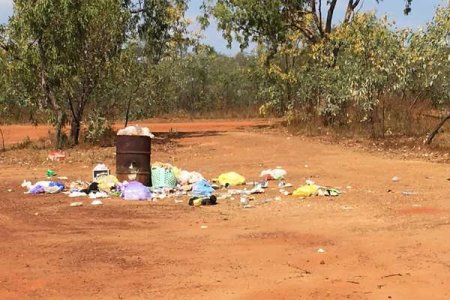Shocking Photo Exposes the Little-Known Aussie Trend That's Destroying Pristine 4WD Tracks!
- Replies 7
As Australians, we take immense pride in our country's natural beauty, and there's nothing quite like the thrill of exploring the rugged landscapes in a 4WD. The Gibb River-Wyndham Road, a 650km track that cuts through the heart of the Kimberley in Western Australia, is a prime example of the kind of untouched wilderness that adventure seekers yearn for. However, a recent photo taken by a 67-year-old traveller has shed light on a disturbing trend that threatens to tarnish the pristine nature of these beloved tracks.
The traveller, Mr. Schouten, and his wife were eager to embark on their journey, but their excitement quickly turned to dismay when they encountered a sight all too common yet often overlooked: a small metal bin overflowing with rubbish at the track's western entry point. The photo he captured is a stark reminder of the inconsiderate behavior that's becoming increasingly prevalent among some visitors to these remote areas.
Mr. Schouten's experience is not an isolated incident. He noted that the eastern end of the track presented a similar scene, with waste scattered around due to inadequate disposal facilities. While it's clear that tourists should not pollute the environment, the issue is compounded by the lack of infrastructure to manage the waste generated by the growing number of travellers.

The surge in domestic tourism, particularly among those taking caravans around the country, has led to campgrounds with bins 'filled to the brim,' leaving many campers with no choice but to scramble for a place to dispose of their rubbish. Mr. Schouten pointed out that while some travellers try to do the right thing by leaving their waste in one spot, the absence of regular collection services exacerbates the problem.
The campervan couple has urged the government to step in and help address the rubbish problem. They suggest that larger skip bins and donation boxes placed at popular campsites and public areas frequented by tourists could significantly reduce the littering issue. Mr. Schouten reflects on how the situation has worsened over the past two decades, with the current waste management practices falling short of today's needs.
Main Roads WA, responsible for emptying roadside bins at rest stops, has acknowledged the challenge and has sought to improve waste capacity. They've replaced standard litter bins with skip bins at key locations and have a schedule for emptying them. However, they also emphasize the responsibility of travellers and campers to dispose of their rubbish appropriately.
Illegal dumping is a growing concern across Australia, with a staggering 53 per cent increase in reported incidents in just one year, according to Snap Send Solve, a nationwide council reporting service. The financial and environmental costs of this trend are significant, and it's clear that a collective effort is needed to combat it.
As members of the Seniors Discount Club, we understand the importance of preserving the natural beauty of our country for future generations. We encourage all travellers to be mindful of their environmental impact and to take their rubbish with them if disposal facilities are inadequate. It's also crucial to report any illegal dumping you may encounter to authorities or through services like Snap Send Solve.
 We'd love to hear your thoughts and experiences on this issue. Have you encountered similar problems while travelling through Australia's beautiful landscapes? What solutions do you think could help mitigate this trend? Share your stories and ideas in the comments below, and let's work together to keep Australia's 4WD tracks pristine for everyone to enjoy.
We'd love to hear your thoughts and experiences on this issue. Have you encountered similar problems while travelling through Australia's beautiful landscapes? What solutions do you think could help mitigate this trend? Share your stories and ideas in the comments below, and let's work together to keep Australia's 4WD tracks pristine for everyone to enjoy.
The traveller, Mr. Schouten, and his wife were eager to embark on their journey, but their excitement quickly turned to dismay when they encountered a sight all too common yet often overlooked: a small metal bin overflowing with rubbish at the track's western entry point. The photo he captured is a stark reminder of the inconsiderate behavior that's becoming increasingly prevalent among some visitors to these remote areas.
Mr. Schouten's experience is not an isolated incident. He noted that the eastern end of the track presented a similar scene, with waste scattered around due to inadequate disposal facilities. While it's clear that tourists should not pollute the environment, the issue is compounded by the lack of infrastructure to manage the waste generated by the growing number of travellers.

A 67-year-old traveller and his wife found a lot of rubbish at a popular 4WD track in Western Australia. Credit: Yahoo! News
The surge in domestic tourism, particularly among those taking caravans around the country, has led to campgrounds with bins 'filled to the brim,' leaving many campers with no choice but to scramble for a place to dispose of their rubbish. Mr. Schouten pointed out that while some travellers try to do the right thing by leaving their waste in one spot, the absence of regular collection services exacerbates the problem.
The campervan couple has urged the government to step in and help address the rubbish problem. They suggest that larger skip bins and donation boxes placed at popular campsites and public areas frequented by tourists could significantly reduce the littering issue. Mr. Schouten reflects on how the situation has worsened over the past two decades, with the current waste management practices falling short of today's needs.
Main Roads WA, responsible for emptying roadside bins at rest stops, has acknowledged the challenge and has sought to improve waste capacity. They've replaced standard litter bins with skip bins at key locations and have a schedule for emptying them. However, they also emphasize the responsibility of travellers and campers to dispose of their rubbish appropriately.
Illegal dumping is a growing concern across Australia, with a staggering 53 per cent increase in reported incidents in just one year, according to Snap Send Solve, a nationwide council reporting service. The financial and environmental costs of this trend are significant, and it's clear that a collective effort is needed to combat it.
As members of the Seniors Discount Club, we understand the importance of preserving the natural beauty of our country for future generations. We encourage all travellers to be mindful of their environmental impact and to take their rubbish with them if disposal facilities are inadequate. It's also crucial to report any illegal dumping you may encounter to authorities or through services like Snap Send Solve.
Key Takeaways
- A 67-year-old traveller and his wife encountered a significant amount of rubbish at a popular 4WD track in Western Australia, highlighting a growing issue with waste disposal in tourist areas.
- The traveller, Mr Schouten, suggests the need for larger bins and more frequent waste collection services to accommodate the increasing number of tourists, emphasising the problem has worsened over time.
- Main Roads WA, responsible for maintaining these areas, has replaced standard bins with larger skip bins at key locations and has improved waste management, but still urges travellers to dispose of their rubbish appropriately.
- There's a nationwide surge in illegal dumping, with a significant increase in reported incidents across various Australian states, indicating a broader problem with current waste disposal solutions.







